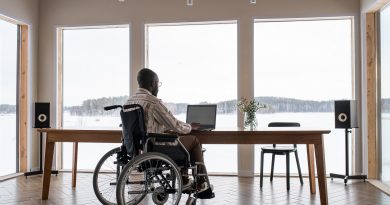9 Ways to Improve Patient Safety in Nursing Homes
Patient safety in nursing homes is a critical concern that affects the well-being of some of the most vulnerable members of our society. Nursing homes are meant to be safe havens for elderly residents who require around-the-clock care and supervision. However, various issues can compromise their safety, including medication errors, infections, and insufficient staffing.
According to recent statistics, many nursing homes face significant challenges in maintaining high safety standards, which can lead to severe health complications for residents. Ensuring patient safety in nursing homes requires a multifaceted approach that involves everyone from administrators to front-line staff.
Here are some effective safety measures that can create a safer environment for residents:

Corporate Wellness App
CircleCare
-
Comprehensive Training Programs
One of the most effective ways to improve patient safety in nursing homes is through comprehensive training programs for staff. Regular training ensures that all staff members are well-prepared to handle various situations, including:
- Emergencies
- Infection Control
- Proper Patient Handling, etc.
Ongoing education and refresher courses are crucial in keeping staff updated on the latest safety protocols and procedures. By investing in comprehensive training programs, nursing homes can equip their staff with the knowledge and skills needed to provide safe and effective care to residents.
-
Higher Education for Nurses
Encouraging and supporting higher education for nurses, such as through RN BSN programs, can have a significant impact on patient safety in nursing homes. Advanced nursing degrees such as RN BSN programs equip nurses with better:
- Clinical Skills
- Critical Thinking Abilities
- Leadership Qualities, etc.
Nurses with higher education are better prepared to handle complex situations and make informed decisions that enhance patient care.
Providing opportunities for nurses to pursue further education and flexible scheduling can help build a more knowledgeable and skilled workforce. By investing in the education of their nursing staff, nursing homes can improve the quality of care and ensure better patient safety outcomes.
-
Improved Communication Channels
Clear and effective communication is vital for ensuring patient safety in nursing homes. Communication among staff members, as well as between staff and patients or their families, plays a significant role in preventing misunderstandings and errors. Regular staff meetings and briefings can help keep everyone informed about any changes in patient care plans or safety protocols.
Using technology, such as electronic health records and communication apps, can also enhance communication by providing real-time updates and facilitating easy access to important information. By improving communication channels, nursing homes can ensure that everyone is on the same page, thereby enhancing patient safety.
-
Regular Safety Audits
Regular safety audits are essential for identifying potential hazards and ensuring that safety protocols are being followed. Safety audits involve a thorough inspection of various aspects of the nursing home, including cleanliness, equipment maintenance, and medication management. By conducting regular audits, nursing homes can identify and address issues before they become serious problems.
A checklist can be used during audits to ensure that all critical areas are covered. Once issues are identified, it is important to take prompt action to rectify them. Regular safety audits help maintain a safe environment for residents and ensure compliance with safety standards.
-
Medication Management
Medication management is a critical aspect of patient safety in nursing homes. Medication errors can have serious consequences for residents, so it is essential to have robust systems in place to ensure accurate medication administration. Electronic medication records and double-checking systems can help reduce the risk of errors.
Educating staff about potential side effects and interactions is also important. This knowledge enables them to monitor residents closely and take appropriate action if any adverse effects occur. By improving medication management practices, nursing homes can significantly enhance patient safety.
-
Adequate Staffing Levels
Adequate staffing levels are crucial for maintaining patient safety in nursing homes. Understaffing can lead to increased workloads for caregivers, which can result in mistakes and compromised care. Ensuring that there are enough qualified and experienced staff members to meet the needs of residents is essential.
Guidelines for determining appropriate staffing levels can help nursing homes maintain a safe and effective care environment. Hiring qualified and experienced staff members ensures that residents receive the care they need. Adequate staffing levels also reduce the risk of burnout among caregivers, which can further improve patient safety.
-
Upgrade Infrastructure
The physical environment of a nursing home plays a significant role in patient safety. Upgrading facility infrastructure can help prevent accidents and ensure that residents are safe and comfortable. Some necessary upgrades include installing handrails in hallways and bathrooms, using non-slip flooring, and ensuring adequate lighting throughout the facility.
Making these improvements can significantly reduce the risk of falls and other accidents. Additionally, ensuring that the facility is accessible for all residents, including those with mobility issues, is crucial. Regular maintenance and updates to the infrastructure can help maintain a safe environment for all residents.
-
Foster Family Involvement
Involving families in the care of their loved ones can greatly enhance patient safety in nursing homes. Families can provide valuable insights into the needs and preferences of residents, which can help staff deliver more personalized and effective care. Encouraging families to be active participants in the care process can also help identify potential safety issues that might otherwise go unnoticed.
Providing families with education and resources on patient safety can empower them to advocate for their loved ones. Establishing open lines of communication between staff and families ensures that concerns are addressed promptly and that families are kept informed about their loved one’s care. By fostering family involvement, nursing homes can create a more supportive and safer environment for residents.
-
Infection Prevention & Control
Infection prevention and control is a critical aspect of patient safety in nursing homes. Infections can spread quickly in such environments, leading to severe health complications for residents. Implementing best practices for infection control is essential, such as:
- Strict Hand Hygiene Protocols
- Personal Protective Equipment
- Vaccination Programs, etc.
Regular monitoring and updating of infection control protocols ensure that they remain effective and aligned with current guidelines. Educating staff about infection prevention and control measures helps maintain a high standard of care and minimizes the risk of outbreaks. By focusing on infection prevention and control, nursing homes can protect residents from harmful infections.
Final Thoughts
Improving patient safety in nursing homes is a multifaceted effort that requires the commitment of everyone involved in the care process. Patient safety should always be a top priority. With continuous effort and dedication to these strategies, nursing homes can significantly enhance the safety and well-being of their residents, ensuring they receive the highest quality of care.








